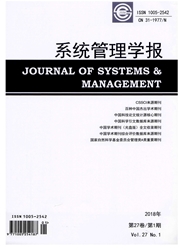

 中文摘要:
中文摘要:
研究了农户和公司在单一市场(即合约市场)和组合市场(即合约与现货市场并存)下的决策行为。通过建立博弈模型,分析和比较了农户和公司在两种市场下的决策特征,发现:在组合市场下的双方交易总量较单一市场有所增加,这表明,组合市场对农户、公司及其顾客都是有益的。组合市场既解决了单一现货市场农产品买卖难的问题,又降低了单一市场下需求和生产的不确定性带来的风险,使得农户、公司和整个农产品供应链的利润都得以提高。
 英文摘要:
英文摘要:
This paper studies a farmer and a company's decision behavior, respectively, in single market (i. e. contract market) and combined market (i. e. coexistence of contract market and spot market). Using game models, we analyze and compare the company and the farmer's decision behavior in the two types of market, and find that the transaction amount is greater in combined market than that in a single one. This indicates that the combined market is beneficial to the farmer, the company and their customers. The combined market paves the way to convenient and easy transactions of agricultural products, decreases the risk brought by the uncertainty of production and demand, and improves the profits of the farmer, the company and the agricultural product supply chain.
 同期刊论文项目
同期刊论文项目
 同项目期刊论文
同项目期刊论文
 Measuring and decomposing efficiency in international tourist hotels in Taipei using a multi-divisio
Measuring and decomposing efficiency in international tourist hotels in Taipei using a multi-divisio A Modified Super-efficiency DEA Approach for Solving Multi-groups Multi-outputs Classification Probl
A Modified Super-efficiency DEA Approach for Solving Multi-groups Multi-outputs Classification Probl A DEA Model for Efficiency Evaluation with Undesirable Output: An Application of Paper Mills along H
A DEA Model for Efficiency Evaluation with Undesirable Output: An Application of Paper Mills along H An Integrated Pricing and Deteriorating Model for a VMI (Vendor Managed Inventory) supply chain with
An Integrated Pricing and Deteriorating Model for a VMI (Vendor Managed Inventory) supply chain with “DEA Studies on Comprehensive Efficiency of Output Allocation with an Application to Paper Mills alo
“DEA Studies on Comprehensive Efficiency of Output Allocation with an Application to Paper Mills alo Ontology of collaborative manufacturing: Alignment of service-oriented framework with service-domina
Ontology of collaborative manufacturing: Alignment of service-oriented framework with service-domina Performances Based Clustering for Benchmarking of Container Ports: An Application of DEA and Cluster
Performances Based Clustering for Benchmarking of Container Ports: An Application of DEA and Cluster new Malmquist productivity index based on semi-discretionary variables with an application to commer
new Malmquist productivity index based on semi-discretionary variables with an application to commer 期刊信息
期刊信息
